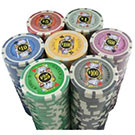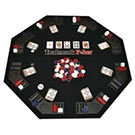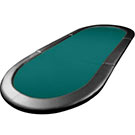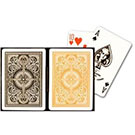Poker PagesLatest Articles
Around the Net
Recommended pagesWelcome
Useful SitesFirst-rate casino online guide with trustworthy online casino reviews and jackpot tracker. If baccarat online is your choice among casino games, visit Baccarat Doc for information. gambling health impactFamiliarize yourself with Formerly the National Coalition Against Legalized Gambling reports we found interesting. www.ncalg.org |
Tournament Poker: Know Your Numbers and OddsPoker Quotes
There's opportunity in poker.... If Horace Greeley were alive today, his advice wouldn't be "Go West, young man, and grow up with the country." Instead, he'd point to that deck of cards on table and say, "Shuffle up and deal. Tournament poker is a hugely different beast to cash game poker. Because the blinds increase at regular intervals, the value of your chips will change throughout the tournament. Indeed, as the blinds rise and the number of players decreases, each decision you make becomes more important. As with any game, such as arcade games, at no point is this importance greater than on the bubble of a tournament. In poker the term “on the bubble” essentially means the point at which the next player to be eliminated will leave with no money, thus giving the remaining competitors at least some return on their investment. To go out on the bubble is not only a major disappointment for any poker player, but a financial disaster. Indeed, because the gap between no money and a minimum payout is the most significant monetary jump in any tournament, it’s important to be spot on with every move you make at this point. One of the best ways to play when you’re on the bubble is to be aggressive and often this involves moving all-in; however, how do you know when to make this sort of move when playing? To help guide your decision making process you can look towards a mathematical framework known as the Independent Chip Model (ICM). Developed as a way to assess the profitability of folding versus moving all-in, the system analyses the table dynamics in conjunction with the tournament’s structure. Making an ICM calculation requires five variables: the size of your stack, the size of your opponent’s stack (the person you’re considering moving all-in against), the size of the blinds, the value of your hand and the tournament’s payout structure. Using a piece of poker software, such as SNG Wizard, a player can input this data and find out whether it’s more profitable to move all-in or fold their hand. While conducting an ICM calculation is too complex for a player to do in their head whilst at the table, you can build up a general feel for which moves are +EV and which aren’t. This requires some study away from the poker table with programmes such as the aforementioned SNG Wizard. By running through a number of scenarios you can begin to understand which moves will make you money and which won’t. Thus, if you’re looking to improve your results in poker tournaments, you need to learn all you can about ICM. Handy Poker Tools |

 Welcome to Leadville Poker Club. Located in Leadville where all is covered with
snow almost all the time, we guarantee warm and friendly atmosphere at poker
tournaments our club regularly holds.
Welcome to Leadville Poker Club. Located in Leadville where all is covered with
snow almost all the time, we guarantee warm and friendly atmosphere at poker
tournaments our club regularly holds.


